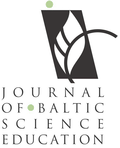| Abstract | The learner selects and transforms information, constructs hypotheses and makes decisions, relying on a cognitive structure that provides meaning and organization to experiences and allows the individual to go beyond. Quantitative data regarding concepts formed about global warming and ozone depletion was obtained through a questionnaire administered to 280 Maltese post-secondary students, who had already attended Environmental Science lessons. In depth group interviews were performed with four focus groups to elucidate underlying reasoning. Besides the presence of lacunae in their knowledge, the study revealed that students formulated their own logical, but sometimes incorrect, frameworks through which they could explain the issues. Concept maps elicited from the data show how students erroneously linked global warming to ozone depletion and stratospheric ozone to tropospheric ozone. Recommendations are made on how learners can think how an expert of that particular knowledge domain would think in that particular circumstance.
The concepts related to current ecological crises should engage students with real life issues that are analysed within social and cultural contexts in order to make valid judgments. An effective Environmental Science curriculum should include a set of organized experiences aimed at helping students develop correct environmental concepts. The results reported in this study can be used to help the teacher in the selection of concepts and how they can be sequenced in meaningful ways. The design of multidisciplinary curriculum units and appropriate teaching strategies that address student understanding of complex natural phenomena can lead to the development of correct conceptual frameworks which are meaningful.
It is imperative for educators to be familiar with what the students already know. The challenge is to design instructional strategies which address these conceptions and attempt to alter them in meaningful ways. This implies a paradigm shift in science education based on constructivism. The educator can help students:
a) identify authentic issues;
b) conceptually analyse scientific knowledge related to these issues;
c) determine their existing knowledge regarding these issues; and
d) design meaningful environmental courses that aim in formulating correct conceptual frameworks.
This will produce correct links between concepts, and transfer of knowledge from one context to another would be facilitated. The outcome will be the creation of more complex meaning in a structured manner.
An incorrect perception could be a point of departure for a constructivist approach, keeping in mind the fragmented knowledge students possess and the mental models they have constructed when this knowledge was put together. Students should be given the opportunity to construct, discover and explain the links formed between the knowledge accumulated in order to build a correct conceptual framework.
Students need opportunities which involve the generation of situated knowledge to develop action-competence. Moreover, scientific concepts taught formally in the classroom should have application in the field in order to help students make sense of whether their actions have the potential to respond to the symptoms of environmental issues, or more importantly, to address the causes. Such learning opportunities should start from early childhood when environmental frameworks will start to develop.
|
